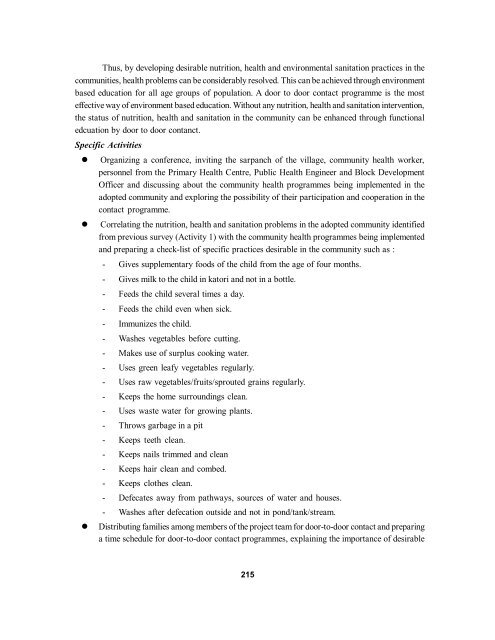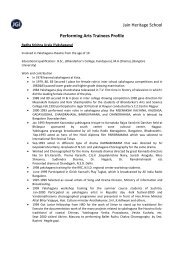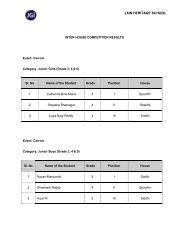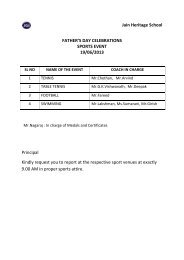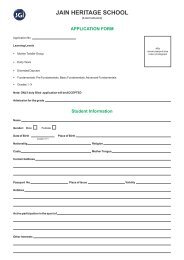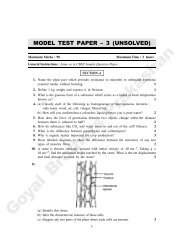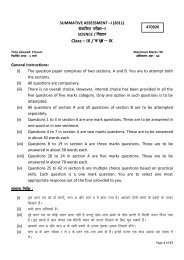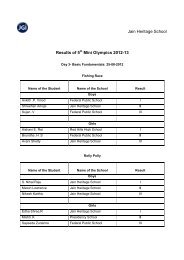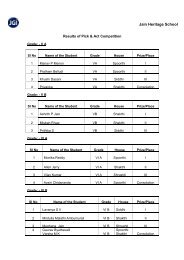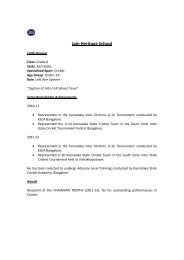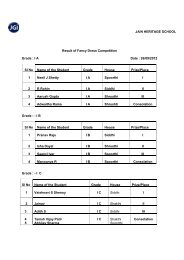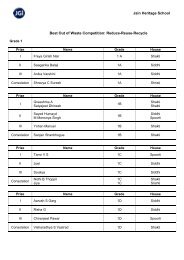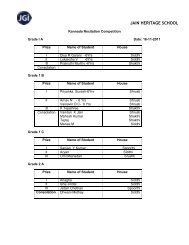Secondary School Curriculum 2012 - Central Board of Secondary ...
Secondary School Curriculum 2012 - Central Board of Secondary ...
Secondary School Curriculum 2012 - Central Board of Secondary ...
You also want an ePaper? Increase the reach of your titles
YUMPU automatically turns print PDFs into web optimized ePapers that Google loves.
Thus, by developing desirable nutrition, health and environmental sanitation practices in the<br />
communities, health problems can be considerably resolved. This can be achieved through environment<br />
based education for all age groups <strong>of</strong> population. A door to door contact programme is the most<br />
effective way <strong>of</strong> environment based education. Without any nutrition, health and sanitation intervention,<br />
the status <strong>of</strong> nutrition, health and sanitation in the community can be enhanced through functional<br />
edcuation by door to door contanct.<br />
Specific Activities<br />
• Organizing a conference, inviting the sarpanch <strong>of</strong> the village, community health worker,<br />
personnel from the Primary Health Centre, Public Health Engineer and Block Development<br />
Officer and discussing about the community health programmes being implemented in the<br />
adopted community and exploring the possibility <strong>of</strong> their participation and cooperation in the<br />
contact programme.<br />
• Correlating the nutrition, health and sanitation problems in the adopted community identified<br />
from previous survey (Activity 1) with the community health programmes being implemented<br />
and preparing a check-list <strong>of</strong> specific practices desirable in the community such as :<br />
- Gives supplementary foods <strong>of</strong> the child from the age <strong>of</strong> four months.<br />
- Gives milk to the child in katori and not in a bottle.<br />
- Feeds the child several times a day.<br />
- Feeds the child even when sick.<br />
- Immunizes the child.<br />
- Washes vegetables before cutting.<br />
- Makes use <strong>of</strong> surplus cooking water.<br />
- Uses green leafy vegetables regularly.<br />
- Uses raw vegetables/fruits/sprouted grains regularly.<br />
- Keeps the home surroundings clean.<br />
- Uses waste water for growing plants.<br />
- Throws garbage in a pit<br />
- Keeps teeth clean.<br />
- Keeps nails trimmed and clean<br />
- Keeps hair clean and combed.<br />
- Keeps clothes clean.<br />
- Defecates away from pathways, sources <strong>of</strong> water and houses.<br />
- Washes after defecation outside and not in pond/tank/stream.<br />
• Distributing families among members <strong>of</strong> the project team for door-to-door contact and preparing<br />
a time schedule for door-to-door contact programmes, explaining the importance <strong>of</strong> desirable<br />
215


